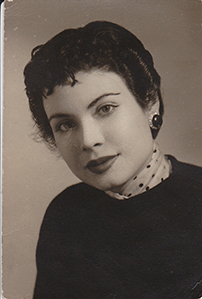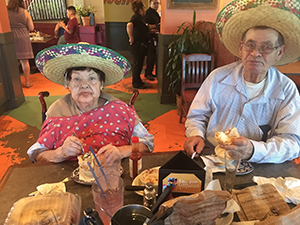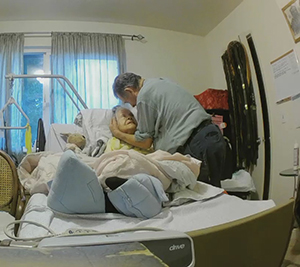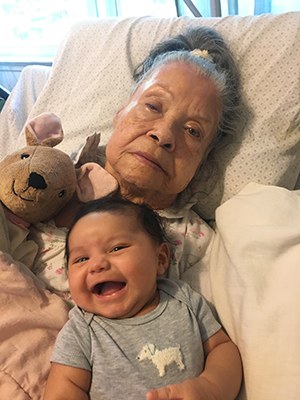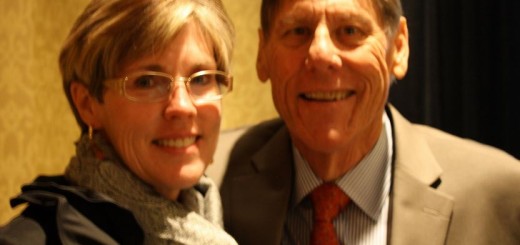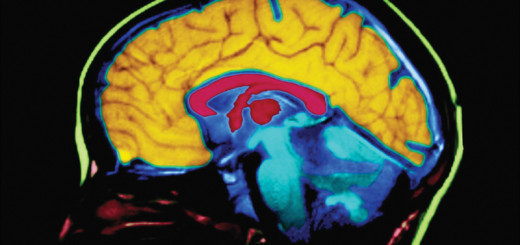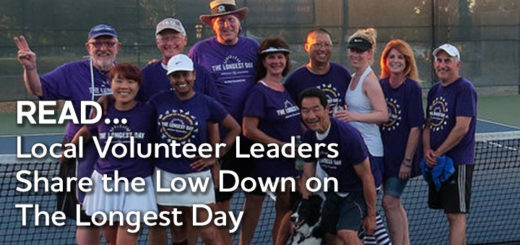Cultural barriers cause a delay in Alzheimer’s diagnosis for North Bay woman
By Maria Martinez
Marin county resident, Maria Martinez, knew in 1997 that something was wrong with her mother. However, because of stigma in the Latino community and language barriers, Maria’s mother went undiagnosed for another 13 years. Now, Maria volunteers her time as an Alzheimer’s Association advocate, to help other families get a timely diagnosis.
There was a house in the neighborhood that didn’t need an introduction or even a point of reference. Everyone knew it because the food was exquisite, the door was always open, and all you had to do was bring a good appetite. My mother preferred it this way. She loved to entertain, and she loved to cook.
This made it difficult to leave my home in Los Angeles, but I wanted to further my career in occupational therapy. I moved to Northern California in 1997. The transition to making San Francisco my new home was exciting at first. My parents, who were immigrants from Mexico with Jalisco roots, were beyond ecstatic. They had always made education a priority and were immensely proud of their only child who was the first to go to college.
I knew deep in my heart I was leaving Dad to “handle Mom.” Things were stable for them for months. I would do my best to continue my monthly visits, but school and work became more challenging. Time came in short supply and I simply couldn’t commit like I once had.
Then the daily phone calls with the same questions started and it quickly became an annoyance. My cell phone would more frequently be switched to silent. At first, I thought she was lonely and depressed but on my next visit back I noticed a big change.
It was her food.
I remember this like it was yesterday, her prized tamales were inedible. When I walked into the kitchen, I was shocked by what I saw. The walls were adorned with post-it notes, pads of scribbled-on paper were scattered about, and she had purchased multiples of the same item. At one point I found eight cheese graters.
My father was in denial to these changes. To make matters worse, in Latin culture it is taboo to discuss mental illness. According to the Alzheimer’s Association 2021 Alzheimer’s Disease Facts and Figures report, Hispanic Americans – more than other racial or ethnic group – are likely to incorrectly believe that a significant loss of memory or cognitive abilities is a “normal part of aging” – with 57% of those surveyed believing this to be true.
To be honest, I did not know the extent of her illness until I started digging through files, reviewing receipts, and asking (a kind way of saying interrogating) family members. It was a difficult journey to convince my parents that medical intervention was needed. Little did I realize; the hard part had just begun.
It was not until later that my concerns gained validity. I was able to establish a rapport with her Spanish speaking doctor. It turned out that she was being double dosed on her medications. With some changes, we were able to get back to some semblance of stability. However, those few months were not to last long.
The cycle was destined to repeat. My father would accompany my mother to her medical appointments but unfortunately waited outside. A revolving door of new doctors would try to treat my mother with very little continuity of care. Sometimes they would not have a translator at their disposal.
At times, my mother would get better, only to end up on a psych ward because she had stopped eating, had wandered away from the house or had become too difficult to manage at home. The frequency of phone calls from concerned neighbors and family friends would increase. It was not until her last hospitalization in 2009, that her doctors suspected Lewy body dementia.
Fast forward in time to one of my returning trips from Los Angeles. A semi-trailer truck changed lanes and nearly crushed me to death on the highway. My husband took one look at the massive hole it had gouged into my car and had had enough. It was time my parents would join me up north. We had a small condo and renovated it to fit their needs. I finally had the chance to really be involved in my mother’s care.
It took another year to get the right assessment, but in 2010, she was given the diagnosis of Alzheimer’s disease. I never forgot that year. The diagnosis was determined by a bicultural and bilingual neuropsychologist. After that, it was the domino effect as everything fell into place.
We paid a tremendous amount in terms of supplemental insurance and medications to get her back on track, but it was worth it. Furthermore, my mother was able to thrive by attending an adult day center in Novato for several years.
We had to hire a caregiver two days a week for four hours a day for the next four years. At $32 a day out of pocket, it was a stretch. It was a luxury to have a private caregiver even for a couple hours but both myself and my father needed it. However, because my parents’ social security income could not cover all of the costs, my husband and I had to help support them.
Then I found out that was about to become a new mother. I realized I was now going to become a “sandwich generation” caregiver – meaning I was not only caring for an aging parent, but also for a child. Sandwich generation caregivers make up one quarter of caregivers for those living with Alzheimer’s or other dementias.
According to the Facts and Figures report, Older Hispanics are about one and one-half times more likely to have Alzheimer’s or other dementias as older Whites. 85% of Hispanic Americans want health care providers who understand their unique experiences and backgrounds, but only 59% believe they have access to culturally competent providers. The top concern voiced by these caregivers is health care providers not listening to what the caregivers say because of their race, color or ethnicity.
I work in health care, so I was able to do the research, ask the questions and navigate through the system. But let me confess, it was beyond exhausting. Imagine not speaking the language, not knowing the medical system or it being taboo to discuss a family matter with others.
My mother took her last breath in her own home on June 2, 2019. It should not take more than a decade to get a proper diagnosis.
Marin resident, Maria Martinez, became an advocacy volunteer for the Alzheimer’s Association after her mother’s death. She doesn’t want other families to have to experience what she did, specifically in the Latino community. As an advocate, Maria is working with her legislators to encourage them to make changes to policies so others can get a timely diagnosis.
This blog was also published in El Observador. You can find it in both English and Spanish.
Learn more:





